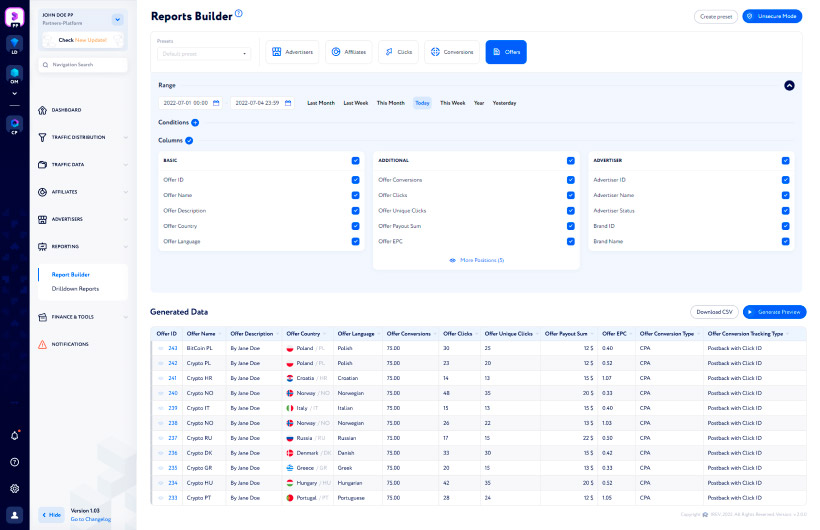

Affiliate Publishers: How to Find, Evaluate & Work with the Right Partners
Assessing Publishers for Your Affiliate Program: A Step-by-Step Approach
Creating an affiliate program for your business can be extremely beneficial. Not only does it allow you to leverage affiliate marketing to reach more customers, but it also frees your team from extra work while still driving better results. Choosing the right affiliate publishers is key to maximizing your program’s success.
Additionally, in the world of e-commerce and digital advertising, an affiliate program is a great way to get your products in front of potential customers without spending much cash on marketing or advertisements. However, when creating an affiliate program, there are several things you need to keep in mind.
An affiliate program is essentially an agreement between you and affiliates, people who market your products. In the affiliate agreement, you need to outline essential details such as commissions that your affiliates receive on sales they drive, roles they have within the program, allowed promotional tools, and any rules that apply specifically to these affiliates (e.g., Non-Disclosure Agreements, etc.).
Understanding the term “affiliate program”
An affiliate program is an arrangement in which one business owner offers another business entity (private person) the ability to sell their product or service by including a hyperlink or a coupon code to their product or service on their website. If the sale is completed through that link, the affiliate will earn a commission, often based on the sale’s value. Affiliate programs are typically used as a way to increase product sales by partnering with other businesses or individuals who already have a following. Affiliate programs are used in a wide variety of industries, including e-commerce, travel, and financial services. Affiliate programs have been growing in popularity since the internet became a household word. They are easy to implement and make use of technology such as cookies or scripts to track purchases and make commission payouts easy for both parties involved.

Relations Between Advertisers and Affiliates
When joining an affiliate program, affiliates join a mutually beneficial relationship between them and a vendor (advertiser). The vendor, in this case, your company, provides the affiliates with information that helps them sell their products. Affiliates get a commission for every sale they send from their website to the vendor’s product page.
If you have finally decided to create your own affiliate program, you need to choose suitable partners. However, getting the right publisher for your affiliate program isn’t easy. In the previous article, we explained where to look for affiliates, but there are also some scoring factors you need to consider before allowing new affiliates to your program. Evaluating potential partners requires a specific strategy and lots of tips. But don’t worry; we have everything you need to know about publishers and how to select the best one for your needs.
How to evaluate publishers for your affiliate program
When it comes to deciding which affiliate partners you want to include in your affiliate program, it’s important to evaluate each potential partner based on their traffic, sales, and social media presence. You want to select partners that are a good fit for your product or service and are likely to convert. You can do this by gathering as much information about each partner as possible. Here are some helpful ways to evaluate potential partners for your affiliate program:
Look for specific affiliates
Depending on the type of affiliate program and partnerships you aim to implement for your product, narrow down your search to only affiliates from these particular types of partnerships.
Especially in the beginning, we wouldn’t recommend frittering away your time on secondary partnerships prompted by the hope that several partnerships will give a higher result. We assume you have researched different publisher types and how they can benefit your business. Thus, you better start with the type of affiliates you find most reasonable for your program; the ones that you could easily explain why particularly they can bring you new sales.
The most common (and efficient!) types of affiliates/ publishers you can partner with:
- Content websites, bloggers & influencers
- Loyalty and cashback sites
- Voucher codes
- Comparison websites
- Social media publishers
- Email marketing
- Retargeting and remarketing
- Shopping directories and portals
Look at their traffic
You can do this by examining their website or social media profiles. See how many followers or likes they have and how long it takes for each post to gain traction. Also, check the inbound links to their site. Ideally, you want to partner with publishers who have a good amount of traffic.
Check their sales
Easier said than done. Though it can be challenging to do, it is important to assess each partner’s sales. You can ask them for old reports to look at their sales history and growth. It is quite a common practice, as advertisers need to know whether affiliates are able to provide sales, not only clicks and impressions.

Check their social media presence
This includes the number of followers on their social media accounts as well as how often they post. Ideally, you want to work with publishers who are active on social media and have a good following but not so much that they are too competitive or busy with other products.
Research products affiliates promote
While it is important to partner with the industry affiliates, you also need to make sure your publishers don’t partner with your direct competitors. It will not bring you any sales and you will only lose your time as most likely affiliates themselves would not agree to promote competing products. At least, top-performing affiliates wouldn’t, as it could ruin their reputation – you cannot genuinely advertiser everything, the audience will simply lose trust in you.
Your primary strategy should be to promote products through affiliates in the same branch, supplementary or intersecting products.
Ask for success proof
The best way to prove expertise is through a case study or customer review. Most businesses and entrepreneurs understand the value and provide this kind of proof, especially if they want to sell their services higher. Besides researching potential affiliates online ask them for any kind of proof of their expertise: testimonials, case studies, portfolios, etc.
Make sure you get affiliate reports
Reporting is an important part of an affiliate marketing program. If for some reason affiliates are not willing to share reports, you can immediately perceive it as a first red flag.
Today you can access affiliate reports from a platform you run your partner program. Thereby, if you run your affiliate program on a SaaS partner platform you could access affiliates’ reports directly through your dashboard. On the example of IREV, you can see how the IREV Partner Platform consolidates reporting from every marketing channel that drives performance and turns data into insights.

With affiliate reports, you can:
- Understand how offers perform and which affiliates drive the biggest value;
- Analyze what works and what does not, and adjust it for better results;
- Break down volumes of data and turn them into actionable insights;
- Understand every click you get from your affiliates, you can see where it came from and which actions led to clicks, and subsequently, what can be optimized for a better Conversion Rate.
To Sum Up
We hope we have shed some light on how you should evaluate potential affiliates. It’s important you carefully select your partners to make sure they are a good fit for your products and have the ability to drive sales. If you need any other piece of advice, you are more than welcome to check our blog or contact us directly. We can give you guidance on how to manage a partner program with minimum effort while reaching efficiency.
The What, Where, Why, and How of Partner Programs
Partner programs are a much-discussed topic in the marketing world, but with good reason. They have the potential to be incredibly successful. Implementing a partner program can be a challenge, but it’s worth it. In this article, we’ll explore the pros and cons of partner programs, and whether they’re right for your business. As you read on, you’ll understand why and how partner programs can be so successful, and how to implement one in your own business.



